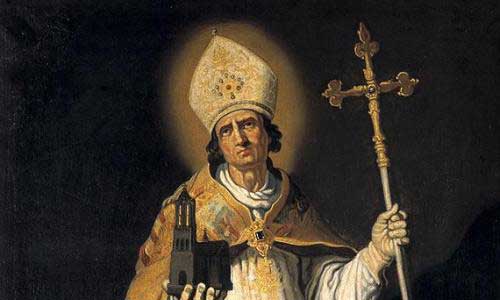This week JACOB MILNESTEIN reports on St Willibrord, an invincible monk who married evangelism with vandalism!
When we imagine a person gifted with invulnerability, we often consider images of a man dressed in blue and red with a large ‘S’ on his chest or some such.
Rarely do we think of an antagonistic old monk with a short temper and a low tolerance for heathens. Yet St Willibrord was just such a man!
Struck with a blade by a fellow priest, St Willibrord– born circa AD 658 in Northumbria – failed to flinch at the attack upon his person. Indeed, such was his piety that not only did the sword fail to cut him but the act of such an attack caused its owner to become possessed by demons as a curse.
Raised almost entirely within holy orders, this saint was decorated veteran of the campaign against neighbouring pagan tribes by recently converted Christian rulers.
Dispatched to a fabled island named Fositesland, this overenthusiastic monk waged a one man war against the native tribe – eating their sacred cows, baptising converts in the sacred wells dedicated to their god and generally causing a nuisance of himself.
The people of Fositesland in return tried everything they could to dislodge the much despised evangelist from their midst, attempting to make a martyr of him at every turn. Yet on each occasion, Willibrord miraculously escaped judgement.
King Radbod in particular took especial offence to the monk and began a retaliatory campaign of burning churches and slaughtering missionary workers following in Willibrord’s example.
Still the saint kept coming back however.
Famed for his piety and holiness, it is a small wonder that his gift of invincibility wasn’t more widely recognised. If perhaps King Radbod had considered the benefits of an army of soldiers with Willibrord’s talents then perhaps Christianity might have seemed a more pleasing prospect.
Imagine an armada of literal Christian soldiers, a Band of Benedictines, a Justice League of Jesuits.
Perhaps it is for the best that Radbod never thought this far ahead, imagine what a difference such power would have had.
Whilst it is evident from accounts of his life that Willibrord revelled in his acts of vandalism and destruction, dedicating his life to what St Boniface termed “spiritual warfare”, it must have come as a disappointment to those remaining pagan nations that he died quietly in his old age.
Of course even if he had been captured, there is no guarantee that fire of the axe could have harmed him any more than a blow from a sabre.
Yet like many heroes, St Willibrord was not dangerous for his powers but more for the fact that he inspired others.
JACOB MILNESTEIN writes stories. His most recent story, “lecteur de tarot” can be found here.


